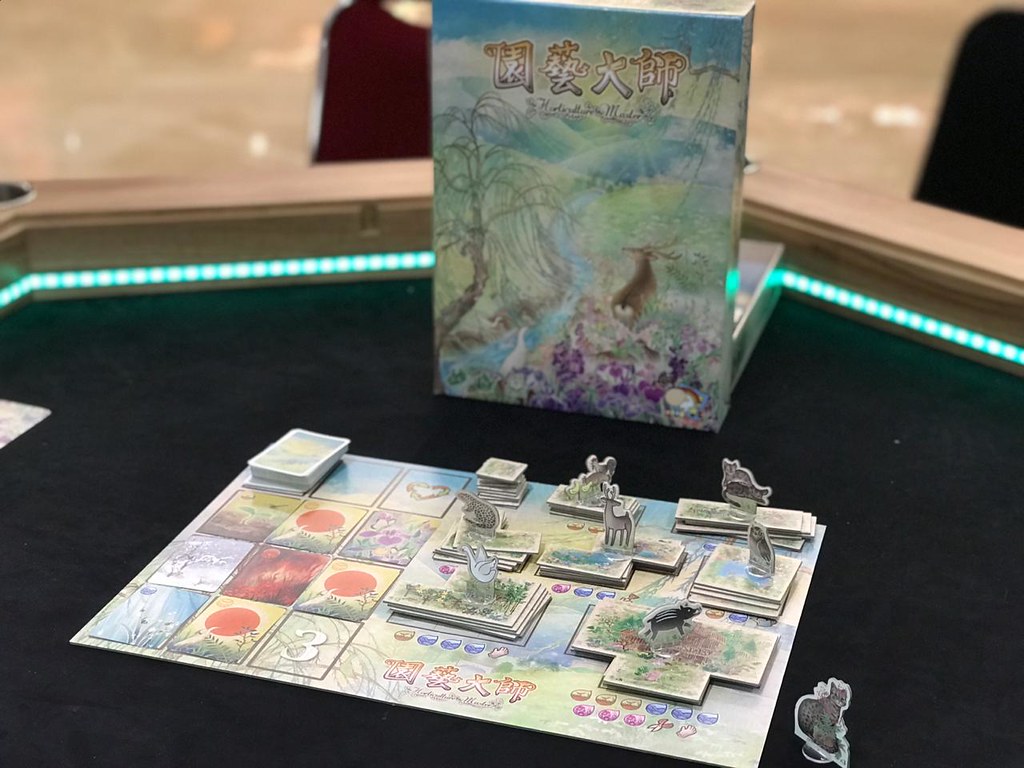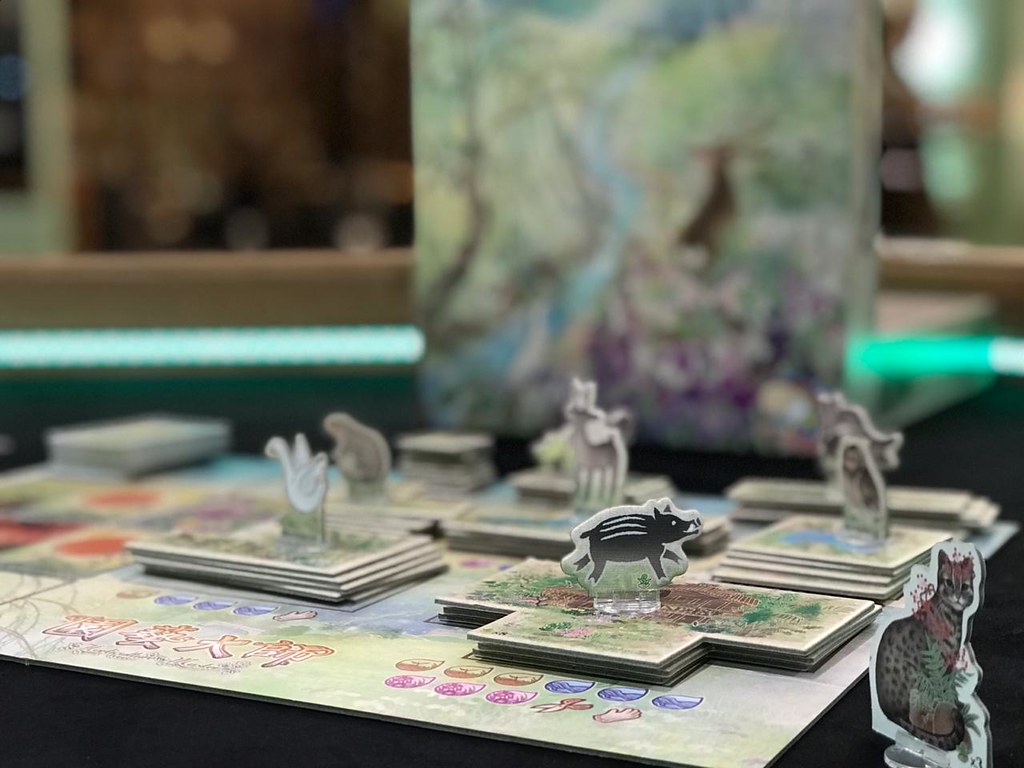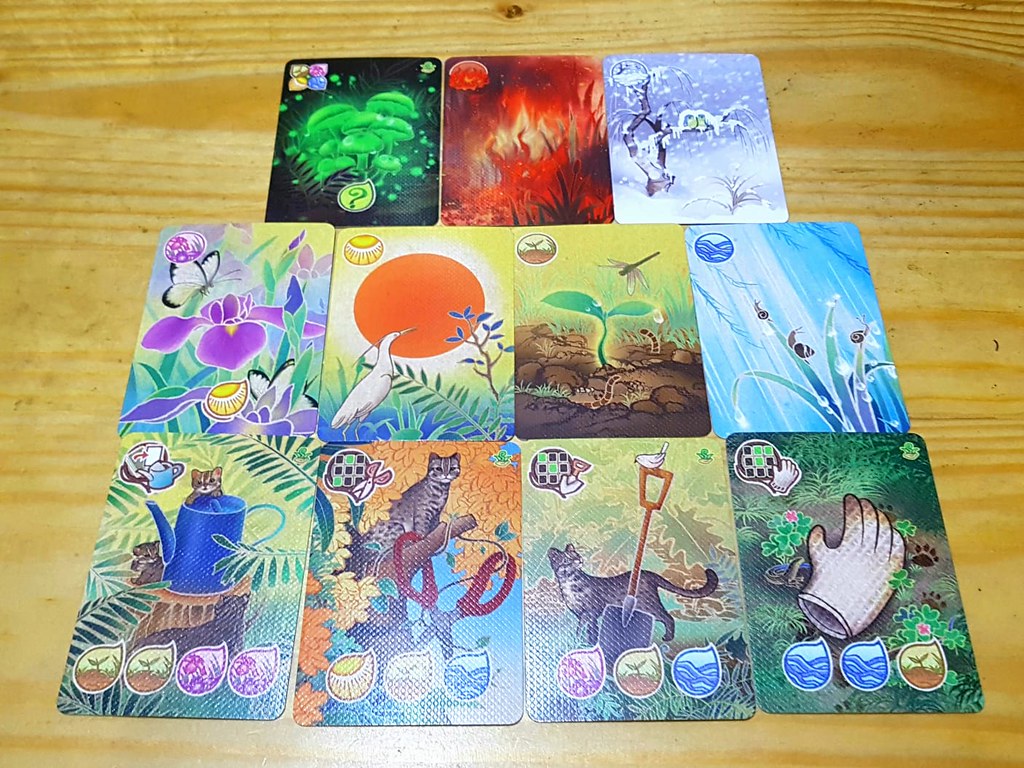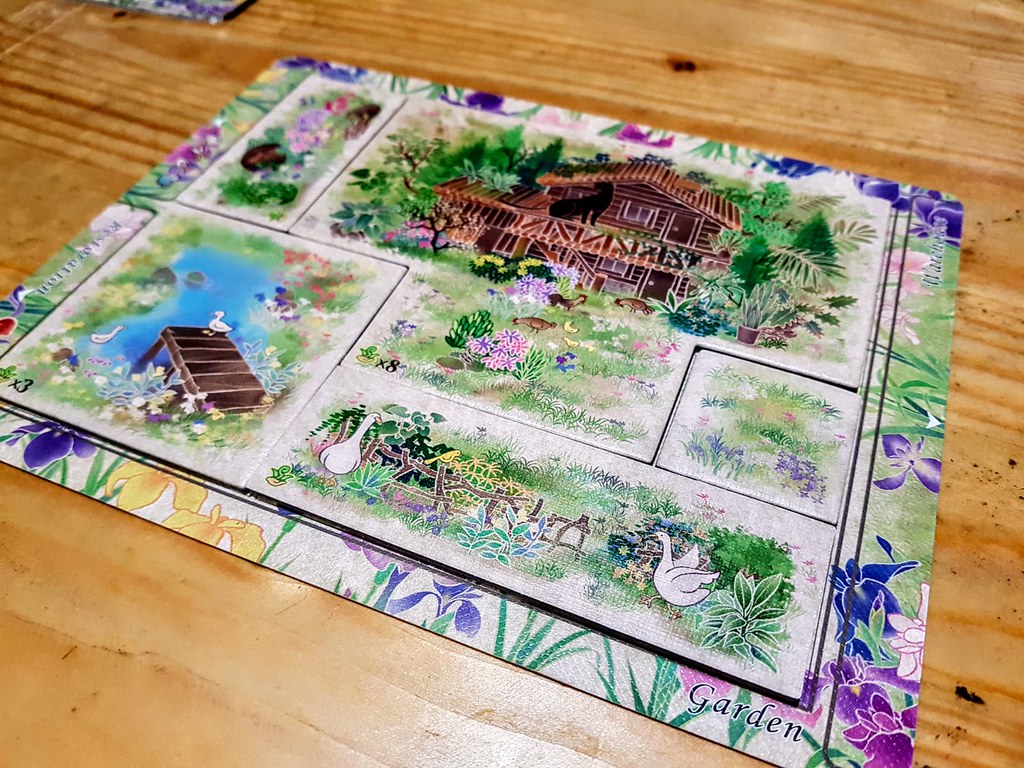Before we talk about Horticulture Master, I need to mention that Taiwan has been producing more board games and designers for years. One of them, Livia from Mozi Games who also attended Spiel Essen 2018 to showcase their front foot. Horticulture Master successfully attracted crowd due to its beautiful art work. From that time also, we were given the chance to review this game. Let’s start the journey to tend the best garden ever.
Background and Rules Overview
In this game, nature calls players to deal with all elements they provide to create the best garden. The player with the best knowledge about the plants and the elements, or in this case, the most points from the garden tiles, will be crowned the Horticulture Master. Players will set up the various tiles, animal standees, and cards in the respective area and put the player board in front of them. Each player takes the Magic Mushroom card as the starting hand.
There are two main phases: Working and Refill Element phase. In the Working phase, players may either draft the hand cards or place the tile to the player board. When drafting, players on their turn may take cards from the available space or take out three cards from a row and put it in the discard pile. There are several types of cards: Element, Reborn, Tool, and Magic Mushroom. Some cards are free and some have cost.
Maximum hand hold is five cards. In order to place the tile, players may need to pay the cost from the cards in hand. The wanted tiles may be paid by using the planted tiles on the player board as well; some requires Tool cards in present. Players may borrow Tool card from other players by paying them one Magic Mushroom card. Some tiles give a bonus effect that will be beneficial for the player.
When refilling the cards, start from the spaces with the lowest number written on it. There are some cards that may manipulate the way the cards are going to be refilled; Fire will burn other cards below it, while Snow will stay in place and prevent the spaces below it from being refilled.
The game ends when there are three kinds of tiles exhausted or when one of the player’s board is full. The game continues until the round ends, and then all players score the points. When a player takes the first tile from each type, he/she gains the animal marker that is worth a point. Each tile has its own point; also with each Tool card, unused Magic Mushroom card, and each tile used to pay the other tile. If the player’s board is full, then he/she gets the Horticulture Master marker and it contributes to three points.
Personal Experience
I would say that Horticulture Master is pretty similar to Patchwork but with more resources to manage. It feels like the combination of puzzle solving with card drafting and hand management mechanism. The option to pay a tile with the drafted cards and the tile placed on player board is really useful when you want to ‘buy’ the bigger tiles that cannot be paid by only using the cards, especially because the hand limit is only five.
The extra points from the animal marker really helps to fire up the competition in the game. Unlike in Patchwork, we cannot flip the selected tile; so all players have to be careful when buying and placing tiles. The side effects from some tiles are written on the hand guide which will benefit players such as adding +1 to your hand or +1 Tool.
The two reborn element cards, Fire and Snow, can manipulate the refill distribution; giving you an option to devise a strategy to not let your opponents get the cards they want or to stall the Refill phase. Don’t forget those two reborn element can also act as a wild card when you have three of a kind.
Players can develop Tools to help get the tile they want. We can even borrow the Tools from other players if needed by paying one Magic Mushroom card to them. You might think that, “Okay, let’s just borrow those tools from other players instead of developing them”, but do mind that each Magic Mushroom card counts as a point at the end of the game.
My Opinion
If you like puzzles and Patchwork, you’ll like Horticulture Master to some degree. In Patchwork, you can flip the tile; but in this game, you cannot and it racks your brain more. The hand management might not be new, but it gives a distinct difference from the older puzzle board games. This game is really recommended for those who want a more challenging puzzle game with resource management add-on.
I expected that the additional mechanism could increase the player interaction which Patchwork lacks, but I still feel that it is not quite there yet. Meanwhile, unlike the other puzzle games which usually requires shorter time, Horticulture Master feels a bit lengthy, perhaps because of the additional components too. Some Tool cards that you’ve been eyeing might just be burnt down with the Fire card in a blink of an eye if you’re not quick, and that may lead to a few other rounds before the cards appear again.
Also, as always, one of my main focuses is on the art work. The illustration is so beautiful! It’s simple but I can feel their effort to design this game. However, I found a subtle inconsistency in the beautiful art work style; it might be because they employed two artists to do the commission.
The option to take three cards out of a row is really helpful to refill the space; however, I think the player that decides to take this action should get extra benefits by doing so. Otherwise, only a few will be brave enough to take such a risky action; this may lead to a low-pace refilling process that makes the game a bit monotone, especially because the player interaction is not that high.
This game is playable with 2-5 players. It feels a bit boring with only 2 players; but too long for a puzzle game with 4 or 5 players. A session with 3 players is the most enjoyable.
I really like the art work so much, despite the inconsistency found in it; it’s still cute and colorful, really lovable. Horticulture Master will be enjoyable for puzzle solvers who need more challenges; the competitive players might find this game to be a real keeper too.
Thanks to Livia and Mozi Games who entrusted us to review their beautiful game! In case you are wondering, the gaming table in the pictures is from The Maple Board Game, a dedicated company producing high quality gaming table from Indonesia.
I am a full-time food technologist during weekdays. However, when the calendar hits weekends, I transform into an avid board gamer. I am a hardcore Legend of the Five Rings (L5R) LCG player from Fantasy Flight Games (FFG). Current hobby: buying board games. My shelf of shame’s list is getting longer, thanks to you, Kickstarter.









